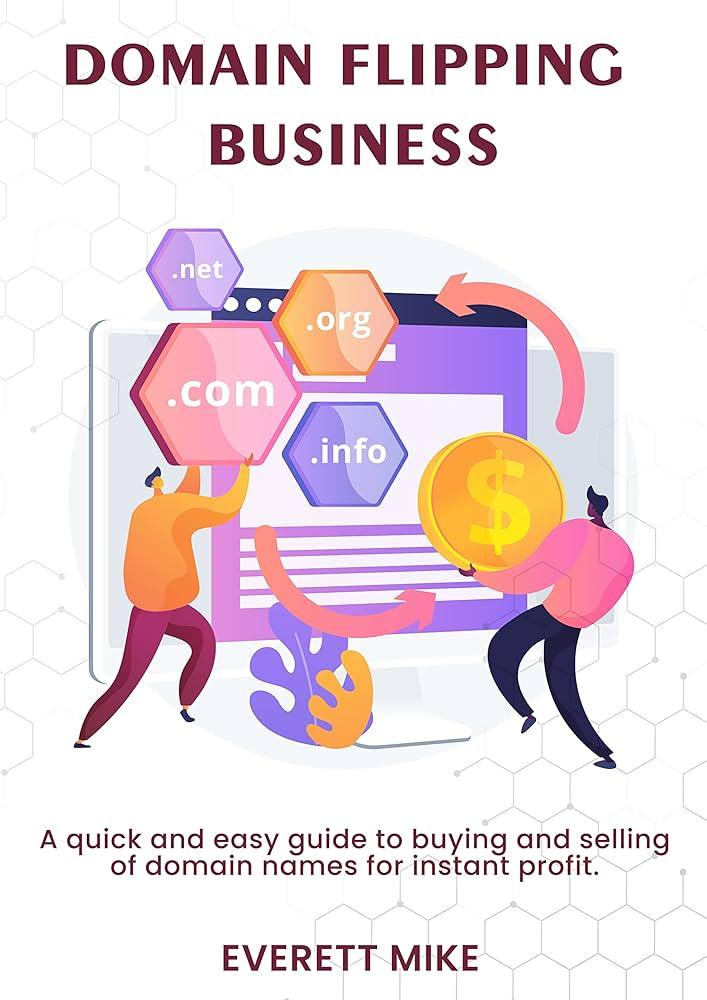Table of Contents
- Understanding the Basics of Domain Name Flipping
- Identifying Valuable Domain Names for Profit
- Tips for Effective Market Research in Domain Flipping
- Crafting Compelling Listings to Attract Buyers
- Navigating Legal Considerations in Domain Name Transactions
- Q&A
- Final Thoughts


Understanding the Basics of Domain Name Flipping
Domain name flipping is an art that combines creativity with market awareness. At its core, it involves purchasing domain names at a lower price and selling them at a higher value. Successful flippers understand the nuances of what makes a domain name desirable. These attributes typically include:
- Length: Shorter names are often more sought after due to their memorability.
- Keyword Rich: Domains that contain popular keywords can attract higher bids.
- Brandability: A name that evokes a strong identity or emotion usually sells better.
To successfully navigate the world of domain flipping, one must engage in diligent research and analysis. Start by exploring various marketplaces such as GoDaddy Auctions, Namecheap, or Sedo, where you can find current trends and sales data. Creating a spreadsheet can be extremely helpful to track valued listings, recent sales, and market trends. Consider the following aspects while conducting research:
| Aspect | Description |
|---|---|
| Market Trends | Review trending industries for rising demand. |
| Comparable Sales | Look for similar domains that have sold recently. |
| Renewal Costs | Estimate your investment and future expenses. |
Equipped with this knowledge, aspiring domain flippers should also consider strategic marketing techniques. Establishing an online presence through social media and a personal website can enhance credibility. Engaging with potential buyers via forums or domain marketplaces allows you to build connections and gauge interest. Moreover, promoting your domains through paid advertisements or SEO-optimized content will likely increase visibility and improve your chances of a successful sale.


Identifying Valuable Domain Names for Profit
When it comes to domain name flipping, one of the most crucial steps is recognizing which domains hold the most promise for profitability. Potential buyers often gravitate toward names that are short, memorable, and relevant to trending industries. As you explore available domains, consider the following criteria:
- SEO Potential: Look for keywords that are currently popular or show signs of steady growth in search volume.
- Brandability: A domain should be easy to spell, pronounce, and remember.
- TLD Choice: While .com domains are often preferred, don’t overlook other established TLDs like .org or .net.
Research tools and platforms can help you gauge the potential of various domain names. Look for domain appraisal services to provide insights into the estimated value based on factors such as age, length, and prior sales of similar names. Additionally, consider leveraging market trends and upcoming technology shifts, as they can inform what types of domains might be particularly desirable.
| Domain Name Type | Characteristics | Potential Use Cases |
|---|---|---|
| Keyword-Rich | Contains popular search terms | SEO, Affiliate Marketing |
| Geographical | Includes a city or region name | Local Business, Tourism |
| Brandable | Unique and catchy | Startups, E-commerce |


Tips for Effective Market Research in Domain Flipping
To successfully navigate the world of domain flipping, conducting thorough market research is essential. Start by identifying trending topics or industries that are gaining traction. Use tools like Google Trends or social media insights to pinpoint niches that are on the rise. This information will guide you in selecting domain names that are not only catchy but also relevant to current market demands. By aligning your domain investment with popular themes, you boost your chances of selling them at a profit.
Another effective approach is to analyze existing domain sales. Websites such as NameBio provide databases of sold domains, offering insights into what buyers are willing to pay. Pay attention to factors such as domain length, keyword usage, and extension types that yield higher sales prices. Understanding these elements can help you make informed decisions when scouting for potential domains. Here are some crucial factors to consider:
- Keyword Relevance: Domains with primary keywords related to a specific niche tend to attract more interested buyers.
- Short and Memorable: Shorter names are often easier to remember and share, increasing their overall marketability.
- Extension Matters: While .com domains typically have the highest value, don’t overlook .net, .org, or even country-specific extensions, depending on your target market.
Leverage online forums and communities dedicated to domain flipping and website development. Engaging with others in the field allows you to share experiences, learn from established flippers, and discover untapped opportunities. Participating in discussions on platforms such as Reddit or specialized Facebook groups can provide clarity on market sentiment and upcoming trends. As you gather insights, consider creating a comparison table to track your findings:
| Domain Extension | Market Value Potential | Target Niche Compatibility |
|---|---|---|
| .com | High | General Audience |
| .org | Medium | Non-profit/Charity |
| .net | Medium | Technology |
| .info | Low | Informational Sites |
Crafting Compelling Listings to Attract Buyers
In the competitive world of domain name flipping, creating listings that capture the attention of potential buyers is crucial. A well-crafted listing should not only showcase the domain name but also emphasize its unique features and potential usage. Start by incorporating a compelling title that includes relevant keywords; this enhances searchability and sets the stage for your audience. Utilize high-quality images or mockups that visually represent how the domain could be developed, creating an instant connection with buyers.
When detailing your domain, make sure to highlight its desirable attributes. Consider including specifications such as:
- Length: Shorter domains are often easier to remember.
- Keywords: Highlight any relevant keywords that can boost SEO potential.
- Extension: Mention if it’s a widely recognized extension like .com, .net, or a niche-specific one.
- Marketability: Discuss potential business ideas or niches the domain could serve.
keep your language clear and persuasive. Use a tone that resonates with your target audience, whether they are entrepreneurs, bloggers, or businesses looking to increase their online presence. To foster trust, consider including a simple comparison table that illustrates similar domain sales or traffic statistics to prove the value of your listing. This can help buyers visualize the investment’s worth. Here’s a sample layout you might consider:
| Domain Name | Sale Price | Domain Length | Extension |
|---|---|---|---|
| example1.com | $5,000 | 7 | .com |
| example2.net | $2,500 | 8 | .net |
By presenting your domain listings in this structured way, you increase the chances of catching the eye of a potential buyer while simultaneously fostering their understanding of the domain’s value.


Navigating Legal Considerations in Domain Name Transactions
When engaging in domain name flipping, it’s essential to be aware of various legal considerations that can significantly impact the transaction process. Trademark infringement is a key issue to navigate; you must ensure that the domain names you buy or sell do not violate any existing trademarks. This means conducting thorough research on the proposed domain’s branding implications. Using a domain name that closely resembles a well-established brand can lead to legal disputes, potentially costing you not only the investment in the domain but also legal fees and liability damages.
Another important consideration is the issue of cybersquatting. According to the Anti-Cybersquatting Consumer Protection Act (ACPA), it is unlawful to register, traffic in, or use a domain name that is confusingly similar to a trademark with the intent to profit from that trademark. To stay clear of potential legal repercussions, maintain transparency in your transactions and document all communications and agreements with buyers or sellers. This ensures you can demonstrate good faith in the event of any disputes.
Additionally, consider the dispute resolution policies provided by the Internet Corporation for Assigned Names and Numbers (ICANN). Familiarizing yourself with the Uniform Domain-Name Dispute-Resolution Policy (UDRP) can help you better understand the landscape of domain name disputes. In any transaction, you should ideally craft clear, detailed agreements that outline the responsibilities, rights, and obligations of both parties. This could mitigate misunderstandings and lay the groundwork for a smoother transfer process.
Q&A
Q&A: Understanding Website Domain Name Flipping
Q1: What is domain name flipping? A1: Domain name flipping is the practice of buying domain names at a low price and then selling them at a higher price for profit. It’s similar to real estate flipping, where individuals invest in properties to enhance their value before reselling them. In the world of domains, this involves identifying names that are catchy, relevant, or have potential future demand.Q2: How do I choose the right domain names to flip? A2: Selecting the right domain names is crucial for successful flipping. Look for domains that are short, memorable, and easy to spell. Keywords that are trending or have high search volume can also add value. Additionally, consider buying expired or underpriced domains that have existing traffic or backlinks, as these can be resold at a premium.
Q3: What factors determine the value of a domain name? A3: Several factors influence a domain name’s value, including length, keyword relevance, extension (.com, .net, etc.), brandability, and traffic history. A domain that is short and contains popular keywords or phrases is likely to fetch a higher price. Additionally, domains that have previously been registered can sometimes carry a value if they come with backlinks or an established audience.
Q4: Where can I buy and sell domain names? A4: There are numerous platforms dedicated to buying and selling domain names. Some popular registrars, like GoDaddy and Namecheap, offer marketplace features where you can list your domains for sale. Additionally, websites like Flippa and Sedo specialize in domain trading, allowing users to auction or negotiate prices for their domains.
Q5: What are the risks involved in domain flipping? A5: While domain flipping can be profitable, it does come with risks. The market can be unpredictable, and it may take time to find buyers willing to pay your desired price. There’s also the chance of ending up with domains that lose value due to changes in industry trends. To mitigate risks, conduct thorough research before purchasing domains and diversify your portfolio.
Q6: How can I promote my domain names to potential buyers? A6: Promoting your domain names can significantly increase your chances of selling them. Utilize social media platforms to showcase your domains and engage with niche communities that may find them appealing. Additionally, consider creating a simple landing page for each domain to highlight its potential uses, showcase its keywords, and improve its visibility in search engines.
Q7: Is there a beginner-friendly way to start flipping domains? A7: Absolutely! Beginners can start by conducting research on trending keywords and browsing expired domain listings. Register domains that pique your interest, and utilize basic selling platforms to list them. Joining forums and groups dedicated to domain flipping can also provide valuable insights and networking opportunities to help you learn from experienced flippers.
Q8: What are some common mistakes to avoid in domain flipping? A8: Common pitfalls include overpaying for domain names that don’t have a clear resale value, neglecting to research potential competition, and failing to understand the importance of SEO. It’s crucial to remain informed about market trends and to set reasonable expectations about sales timelines and pricing to achieve success in domain flipping.
Whether you’re a curious beginner or looking to refine your flipping strategy, understanding these fundamentals can set you on the path to becoming a successful domain name flipper. Happy flipping!

